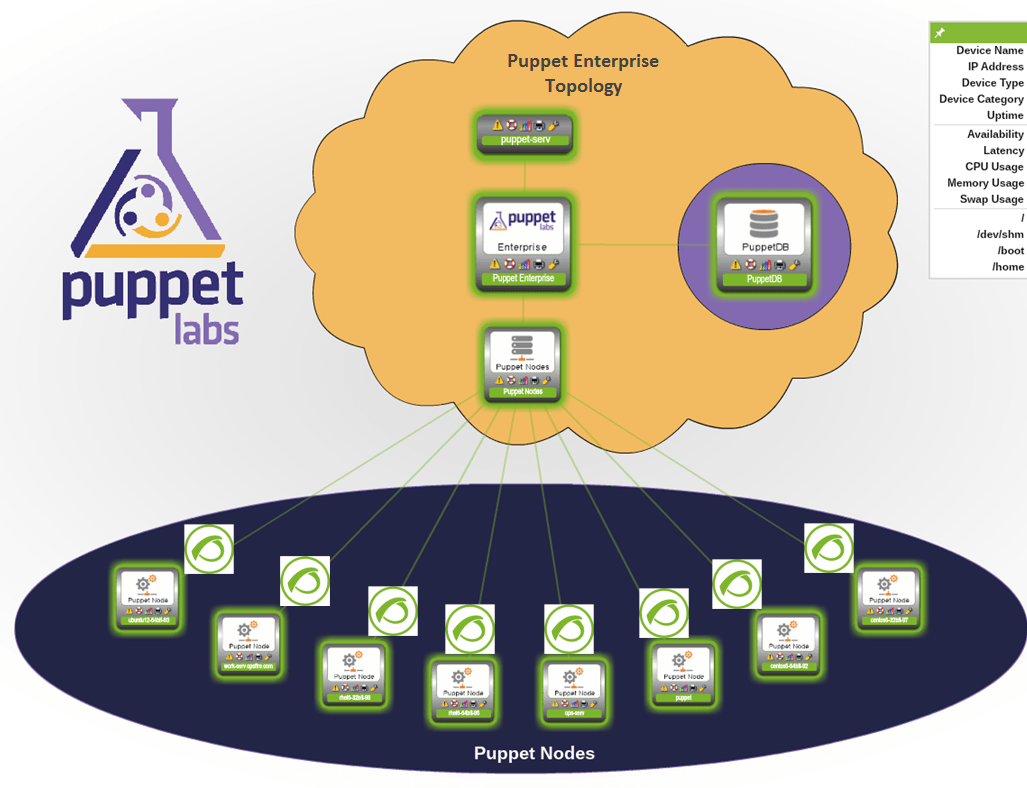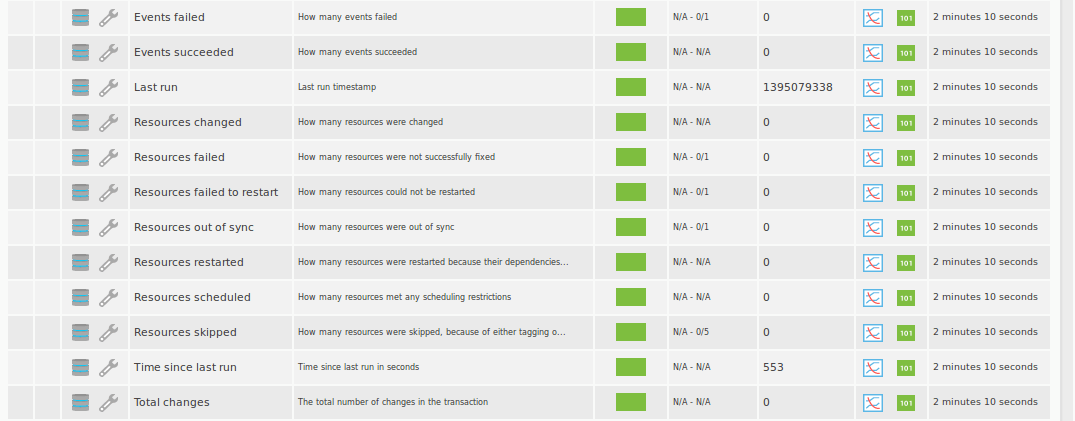This article is going to serve as a foundation for automating the automatic process of installing Pandora FMS’ agents on multiple systems simultaneously: either Windows, Linux or Unix. The tool that has been used for this process is Puppet.
Puppet is a new generation OpenSource solution for server automation.
It features a declarative language used to express the system configuration, a client-server scheme for distribution, and a library to run that configuration.
Among its various activities, it allows us to control the execution of different services on a machine, centralized control of configuration files, installation package management, management of presence and availability of mount points, user and group management and deployment of machines.
In this article we will show the declarative language that should be configured in Puppet (Puppet’s modules) with the prerequisites that in the net where you will deploy agents, has already installed the Puppet’s server and clients on the different computers.
As indicated, Puppet makes the deployment through “manifests”. This manifests are written in Puppet’s own code and tell Puppet clients the process that must be performed to accomplish the ultimate goal, which in our case will be to install, configure and start the agents.
Puppet’s main folder is by default /etc/puppet. This folder may vary depending on Puppet’s installation path.
Inside /etc/pupept/files, where all the static files are placed to be sent to the clients we are going to introduce the necessary files for be deployed in the clients, we are setting the necessary files for the agent deployment:
- Software agent linux and/or windows (agent in tar.gz format)
- Agent’s configuration file that contains the configuration. One of the most important things is the IP address of the server, and the modules definition. If we are going to deploy agents to both Windows and Linux platforms, we need to have different configuration files for each OS, because the module definition could not be different.
Inside /etc/puppet/manifests folder we will create the resources, which are the steps that Puppet will perform in the agent deployment.
First, create a init.pp file inside /etc/puppet/manifests. This file contains the resources of the module.
For a Unix agent deployment, this would be the content of the init.pp file:
class install_agent_unix {
File [‘pandorafms_agent_unix-5.1.tar.gz file’] → Exec [‘Extract tar’] → Exec [ ‘Instalar Pandora Agent’] → File [‘pandora_agent.conf file’] → Service [‘pandora_agent_daemon service’]file { ‘pandorafms_agent_unix-5.1.tar.gz file’:
owner => root,
group => root,
mode => 777,
source => “puppet:///files/pandorafms_agent_unix-5.1.tar.gz”,
path => “/tmp/pandorafms_agent_unix-5.1.tar.gz”}
exec { ‘Extract tar’:
path => “/bin:/usr/bin”,
Unless => “find /tmp/pandorafms_agent_unix-5.1”,
Command => “tar -xzf /tmp/pandorafms_agent_unix-5.1.tar.gz”,}
exec { ‘Instalar Pandora Agent’:
Command => “/tmp/pandorafms_agent_unix-5.1/pandora_agent_installer –install,
}
file { ‘pandora_agent.conf file’:
owner => root,
group => root,
mode => 644,
source => “puppet:///files/pandora_agent.conf”,
path => “/etc/pandora/pandora_agent.conf”,}
service { ‘pandora_agent_daemon service’:
ensure => running,
name => “pandora_agent_daemon”,
enable => true,}
}
As a summary, what we are going to do is send this file, unzip it, run the installation, send the configuration file and run Pandora’s agent.
If we are deploying Windows agents, the file would be instead:
class install_agent_wdos {
File [‘PandoraFMS_windows_agent_v5.1.setup.exe file’] → Exec [ ‘Instalar Pandora Agent’] → File [‘pandora_agent.conf file’] → Service [‘pandora_agent service’]file { ‘pandorafms_agent_unix-5.1.setup.exe file’:
owner => root,
group => root,
mode => 777,
source => “puppet:///modules/pandorafms/pandorafms_agent_unix-5.1.setup.exe“,
path => “C:\PandoraFMS_windows_agent_v5.1.setup.exe”}
exec { ‘Instalar Pandora Agent’:
Command => “C:\PandoraFMS_windows_agent_v5.1.setup.exe /mode Silent /prefix c:\agente_pandora,
}
file { ‘pandora_agent.conf file’:
owner => root,
group => root,
mode => 644,
source => “puppet:///modules/pandorafms/pandora_agent.conf“,
path => “c:\agente_pandora\pandora_agent.conf”,}
service { ‘pandora_agent_daemon service’:
ensure => running,
name => “pandora_agent_daemon”,
enable => true,}
}
Bear in mind that Windows Puppet agents are oficially supported on Windows Server version 2003, 2008. They are not on other version, but it should work.
Once we have configured the manifest, the only thing left to do is associate this manifest to every node or systems that we want this agent to be installed.
/etc/puppet/manifests/site.pp
An example of this configuration to apply to every node would be:
node unix_agent {
include install_agent_unix
}
node windows_agent {
include install_agent_wdows
}
There are various ways to associate the classes to Puppet nodes, in this example we have chose the following, but Puppet’s administrator can do it in a different thiway, for instance to making it compatible with the actual installation of Puppet in its environment. For doing that you can use this manifests to use in your configuration.
Puppet’s agents monitorization with Pandora FMS
For monitor Puppet’s agents, we have a plugin in our module library of pandorafms.com http://pandorafms.com/index.php?sec=Library&sec2=repository&lng=en&action=view_PUI&id_PUI=600 that gathers the following information from a Puppet agent:
-
Last run
-
Time since last run
-
Is out of sync? → If it’s out of synchronization
-
Resources changed/failed/failed to restart/restarted/scheduled/skipped
-
Events failed/succeeded
-
Total changes
The plugin is written in Ruby, so you will need Ruby to be installed on the system.
For executing the plugin we must only find the last_run_summary.yaml file, where the Puppet agent stores the last execution time it was ran. The file structure is like this:
time:
group: 0.001692
last_run: 1317804488
class: 0.003929
yumrepo: 0.020103
service: 9.017434
schedule: 0.004151
cron: 0.010546
config_retrieval: 15.0572321414948
total: 34.9742621414947
package: 0.588751
filebucket: 0.000687
file: 8.895422
exec: 1.361625
user: 0.01269resources:
total: 194
changed: 0
failed: 0
failed_to_restart: 0
out_of_sync: 0
scheduled: 0
skipped: 0events:
total: 0
changes:
total: 0
By default, this file can be found at /var/lib/puppet/state/last_run_summary.yaml, so the plugin execution would be like this:
module_plugin <ruby_path> /etc/pandora/plugins/pandora_puppet.rb –summary-file /var/lib/puppet/state/last_run_summary.yaml
In Windows, the last_run_summary.yaml can be found at C:\ProgramData\PuppetLabs\puppet\var\state
Puppet’s server monitoring with Pandora FMS.
To deliver a proper Puppet’s server monitoring, the main requisite is having a Pandora’s agent installed in the Puppet server.
Below we illustrate how the configuration of the different modules that would have to be set in the Pandora’s agent configuration file:
1.- Puppetmaster and puppetdb status
Boolean type module that will show if the puppet server is running or not. It will return 1 if possitive, or 0 if it’s not.
module_begin
module_name Status puppetmaster
module_type generic_proc
module_exec /etc/init.d/puppetmaster status | grep running | wc -l
module_description Status puppermaster
module_endmodule_begin
module_name Status puppetdb
module_type generic_proc
module_exec /etc/init.d/puppetdb status | grep running | wc -l
module_description Status puppetdb
module_end
2.- Puppet’s manifestos configuration status
The Puppet server itself has a tool that allows us checking the status of puppet’s manifestos. If we select the directory where these manifestos are stored, we can check them all.
We have two ways to monitor this. The first one, is showing us if there is an anomaly or not, and the other one is gathering an error when it is present.
module_begin
module_name Status manifests
module_type generic_proc
module_exec puppet parser validate /etc/puppet/manifests/ | wc -l
module_critical_inverse 1
module_description Status manifest
module_endmodule_begin
module_name Manifests errors
module_type async_string
module_exec puppet parser validate /etc/puppet/manifests/
module_description Status manifest
module_end
3.- Check if all the Puppet agents are signed
With the next module we can check if all the agents are signed in the Puppet server, therefore working without an issue.
module_begin
module_name Puppet agents certs status
module_type generic_proc
module_exec puppet cert –list | wc -l
module_critical_inverse 1
module_description Status Puppet agents certs
module_end
4.- Puppetmaster and puppetdb CPU and RAM usage
Shows the CPU % usage and RAM of puppet services:
module_begin
module_name Cpu Use % Puppetmaster
module_type generic_data
module_exec ps aux | grep puppetmaster | grep -v grep | gawk ‘{print $3}’
module_description Cpu Use % Puppetmaster
module_endmodule_begin
module_name RAM Use % Puppetmaster
module_type generic_data
module_exec ps aux | grep puppetmaster | grep -v grep | gawk ‘{print $4}’
module_description RAM Use % Puppetmaster
module_endmodule_begin
module_name Cpu Use Tot % puppetdb
module_type generic_data
module_exec ps aux | grep puppetdb | grep -v grep | awk ‘{sum += $3} END {print sum}’
module_description Cpu Use % Puppetdb
module_endmodule_begin
module_name RAM Use Total % Puppetdb
module_type generic_data
module_exec ps aux | grep puppetdb | grep -v grep | awk ‘{sum += $4} END {print sum}’
module_description RAM Use Total % Puppetdb
module_end
Pandora FMS’s editorial team is made up of a group of writers and IT professionals with one thing in common: their passion for computer system monitoring. Pandora FMS’s editorial team is made up of a group of writers and IT professionals with one thing in common: their passion for computer system monitoring.



















